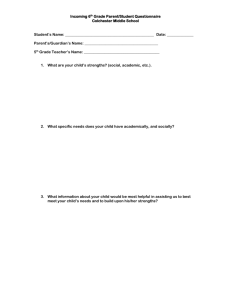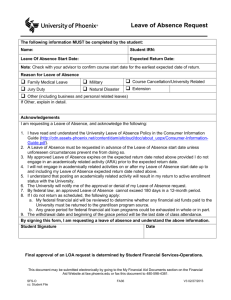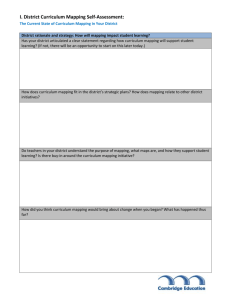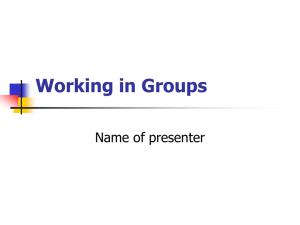Click here for Parent Teacher Conference
advertisement
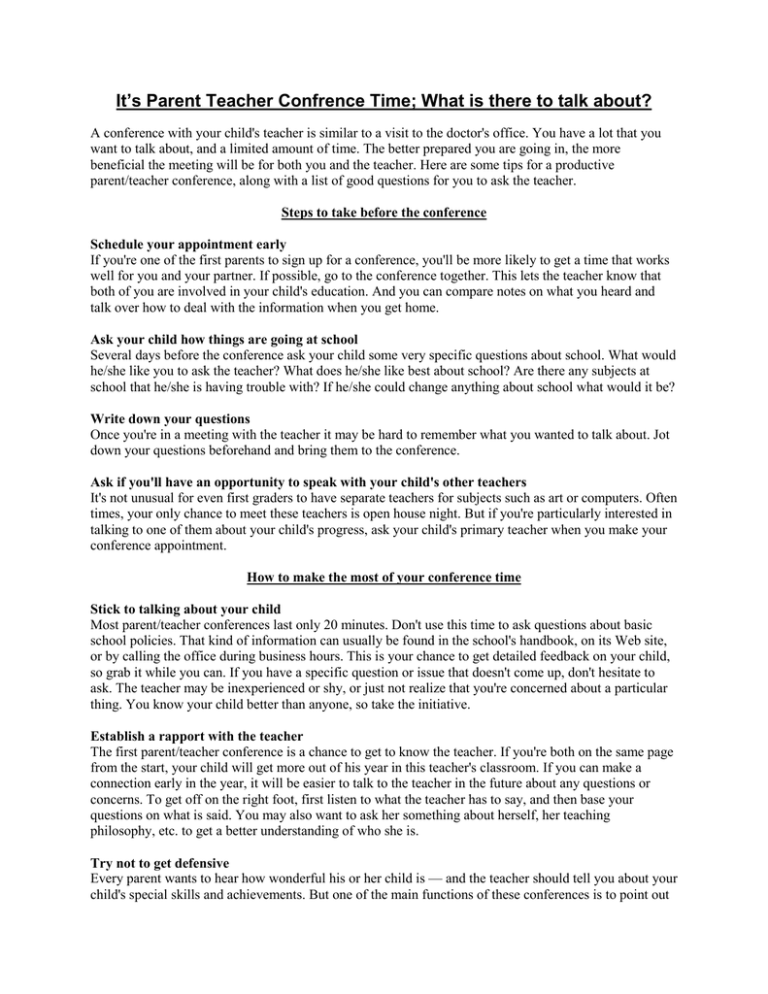
It’s Parent Teacher Confrence Time; What is there to talk about? A conference with your child's teacher is similar to a visit to the doctor's office. You have a lot that you want to talk about, and a limited amount of time. The better prepared you are going in, the more beneficial the meeting will be for both you and the teacher. Here are some tips for a productive parent/teacher conference, along with a list of good questions for you to ask the teacher. Steps to take before the conference Schedule your appointment early If you're one of the first parents to sign up for a conference, you'll be more likely to get a time that works well for you and your partner. If possible, go to the conference together. This lets the teacher know that both of you are involved in your child's education. And you can compare notes on what you heard and talk over how to deal with the information when you get home. Ask your child how things are going at school Several days before the conference ask your child some very specific questions about school. What would he/she like you to ask the teacher? What does he/she like best about school? Are there any subjects at school that he/she is having trouble with? If he/she could change anything about school what would it be? Write down your questions Once you're in a meeting with the teacher it may be hard to remember what you wanted to talk about. Jot down your questions beforehand and bring them to the conference. Ask if you'll have an opportunity to speak with your child's other teachers It's not unusual for even first graders to have separate teachers for subjects such as art or computers. Often times, your only chance to meet these teachers is open house night. But if you're particularly interested in talking to one of them about your child's progress, ask your child's primary teacher when you make your conference appointment. How to make the most of your conference time Stick to talking about your child Most parent/teacher conferences last only 20 minutes. Don't use this time to ask questions about basic school policies. That kind of information can usually be found in the school's handbook, on its Web site, or by calling the office during business hours. This is your chance to get detailed feedback on your child, so grab it while you can. If you have a specific question or issue that doesn't come up, don't hesitate to ask. The teacher may be inexperienced or shy, or just not realize that you're concerned about a particular thing. You know your child better than anyone, so take the initiative. Establish a rapport with the teacher The first parent/teacher conference is a chance to get to know the teacher. If you're both on the same page from the start, your child will get more out of his year in this teacher's classroom. If you can make a connection early in the year, it will be easier to talk to the teacher in the future about any questions or concerns. To get off on the right foot, first listen to what the teacher has to say, and then base your questions on what is said. You may also want to ask her something about herself, her teaching philosophy, etc. to get a better understanding of who she is. Try not to get defensive Every parent wants to hear how wonderful his or her child is — and the teacher should tell you about your child's special skills and achievements. But one of the main functions of these conferences is to point out areas where your child has room to develop. The teacher may even suggest testing, special classes, or some change in your behavior. Keep in mind that this is a part of all parent-teacher conferences. Fight the urge to argue with the teacher or dismiss her comments. She is not blaming you or your child. The point of this meeting is to get an assessment of how your child is doing in school and to look for ways you can help him do even better. Remind yourself that the teacher is on your side and the two of you have the same goal: to help your child learn all that he can. Take a notepad and pen After the meeting is over you may forget some of what you discussed. Jotting things down as you go along will help jog your memory later. Taking notes is also a good way to let the teacher know you're really paying attention. Size up the social scene How well your child fits in socially can affect how well he learns. Ask the teacher how he gets along with the other students. Does he always hang out at recess with the same kids? Who are they? Is he bullying anyone? Is anyone bullying him? Is the teacher concerned about your child's ability to get along with others and participate in class? Give the teacher relevant information Let the teacher know of any changes at home. A new baby, a divorce, or a death in the family can all affect the way your child behaves in the classroom. Resist the urge to talk about his successes outside of school, though. As much fun as it is to tell cute stories, this meeting is about assessing your child's academic progress. When speaking to other teachers stick to their area of expertise If you have the opportunity to meet with your child's other teachers, limit your questions to their particular subject. Discuss art with the art teacher, reading with the reading expert and so on. Leave with an action plan Before you shake hands and say goodbye, find out the best way to follow-up with the teacher. Can you call her? Does she have an e-mail address you can use? You may think of other questions later so find out the best way to ask them. As you end the conference, review any decisions that you've made together. And if you feel it's necessary, request another meeting. Sample Questions My child seems to be doing well academically?(Possibly does not feel challenged) 1. What will my child be learning this year in Reading, Math, Social Studies, and Science? 2. What grade level is my child performing on in Reading, Math, Social Studies, and Science? 3. How is my child doing in relation to the rest of the class? 4. What are my child’s strengths and weaknesses academically, socially, and behaviorally? 5. Could you tell me about my child's work ethic, relations with other children, and attitude toward learning? 6. How do you inform parents and students about the academic standards they’re expected to meet? 7. Could you make class assignments that are more challenging for my child? 8. What can I do at home to enhance my child's educational experience? And/Or My child maybe struggling academically? 1. What is my child's ability level, and are they working up to that ability? 2. What knowledge, skills, and/or tasks should my child master before the next grade level? 3. How are grades determined in your classroom? 4. How will my child be assessed/evaluated? What Kind of information do you use to evaluate students? 5. How do you accommodate or modify your teaching, the material, and/or assessments to help my child learn? 6. How much time should be spent on homework, and what can I do to help with that homework? 7. What exactly do you feel is the problem or problems that are causing my child to struggle in school this year? 8. How can I help my child do better in school? And/Or My child maybe having a tough time behaviorally, emotionally and/or socially. 1. Does my child have any friends at school? 2. Why do you feel my child is having problems socializing with other children? 3. Is my child behaving appropriately in the classroom, hallways, playground? 4. Is there anything you can do in the classroom to help my child feel more comfortable around his/her peers and/or you? 5. Do you have any suggestions about what I could do at home to help my child get along better with his/her classmates? 6. What suggestions do you have about ways my child could improve his/her relationship with you? 7. How will you know when my child is ready for the next grade level academically? 8. What will you do for us if you do not feel my child is not ready for the next grade level academically? And/Or Curriculum QUESTions-The curriculum QUESTions process is a K-12 initiative designed to facilitate a systemic change in the way we educate our children. 1. What do we teach? – First and foremost our curriculum must be aligned with the State standards. Teachers must be given the time and guidance to become intimately aware of the content expectations. 2. When do we teach it? Through the development of pacing guides, our teachers have articulated a focused plan of instruction that will ensure that all objectives are taught at the appropriate grade level. 3. How will we know if the students have learned? – Each core content area at each grade level administers a common quarterly assessment. These assessments test the specific content expectations outlined in the pacing guides. The tests are scored at the district level and data is returned to the teachers and administrators within 1 week of the test date. 4. How do we teach? – As our benchmark assessments identify weaknesses in our instructional methods we have provided direct and focused professional development. 5. What will we do with those students who have not learned? – Following the pyramid of intervention model, teachers and administrators are working collaboratively to institute interventions for those students who do not meet the standard performance level on the benchmark assessments.
